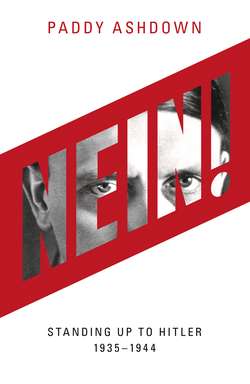Читать книгу Nein!: Standing up to Hitler 1935–1944 - Paddy Ashdown, Paddy Ashdown - Страница 23
На сайте Литреса книга снята с продажи.
10 Switzerland
ОглавлениеIn war, neutral countries always become hotbeds for espionage.
In World War II, these neutral spaces were Spain, Turkey and Switzerland. The greatest of these, in spying terms, was Switzerland, which after the fall of France in June 1940 became a tiny enclave of freedom at the heart of the Axis behemoth.
It was through Switzerland, more than any other neutral country, that the German resistance probed for an early peace with the Allies and passed them, especially via Hans Oster, crucial intelligence on Hitler’s battle plans.
The invasion of Poland started a flood of secret agents and intelligence organisations taking refuge in the Swiss Federation. As the countries of Western Europe fell to Hitler’s stormtroopers, many more made their way to this small, isolated redoubt of freedom to ply their trade.
The Swiss government, for obvious reasons, had a strong interest in knowing what was going on around their encircled state. Almost all the major combatants in the war, including those which would in due course have governments-in-exile in London, had legations and consulates scattered across Switzerland. These housed, as the Swiss well knew, not just diplomats, but also nests of spy-masters running agents into their home countries, and especially into Germany. The Swiss response to all this spying in their country was to adopt a policy of benign ignorance. Provided it was not so blatant as to cause a diplomatic protest which could endanger Switzerland’s neutrality, and provided the Swiss got a fair share of any intelligence which affected their own security, they didn’t much care. The best way to get intelligence on Hitler’s intentions towards Switzerland, they argued, was to use others to get it for them as the price for being permitted to operate from the Swiss Republic.
There was one exception to this rule: the Soviet Union. Russia, being communist and revolutionary, was not at all welcome in this Alpine fortress of stability and energetic free-market capitalism. Russian spying from Switzerland had to be conducted by entirely secret and hidden networks, which the Soviets started constructing through agents infiltrated into Switzerland some time before the war started. When the Swiss occasionally uncovered these secret Russian networks, they mostly let them run, under discreet surveillance to see where the espionage trail would lead. In cases where, because of diplomatic complaints, they had to roll up a Russian network, the penalties imposed by Swiss courts for Soviet spying on Swiss territory tended to be minor and symbolic, provided the activity concerned was directed at one of the other combatant powers, and not at Switzerland itself. The Swiss authorities were, on the whole, rather restrained in applying the ultimate penalty for spying, which at the time was death.*
This generally tolerant policy towards foreign spying on Swiss territory was applied variably. The Swiss themselves had a capable intelligence service, especially when it came to signals interception and counter-intelligence.
Their dealings with other intelligence services based in the country were driven exclusively by Swiss interest. Their closest working relationship was with Britain’s SIS, and their most distant one with the Germans – or at least those Germans loyal to Hitler. This was not because the Swiss liked the British any better than the Germans – after all, the greater part of Switzerland is German-speaking. It was because Hitler had plans to invade Switzerland (Operation Tannenbaum), and London did not. If they wanted to see what Hitler was planning, one of the best ways to do so was through the eyes of British spies. The other key window on German intentions was, of course, through German resisters like Ludwig Beck, who established contact with ‘foreign powers’ through Basel in 1938, or Hans Bernd Gisevius, who visited Lausanne in 1939 immediately after ‘the rape of Prague’, in order to send the message to London that Poland was next.
